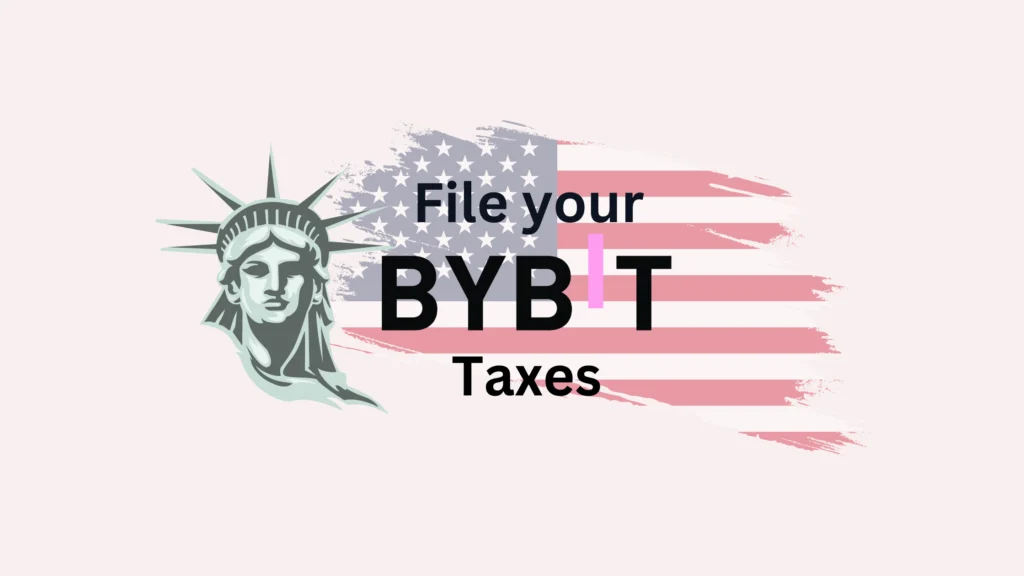This guide helps you understand and calculate Crypto taxes in the USA. It provides clear and simple instructions to help you accurately navigate the process.

Do you have to Pay Taxes on Crypto?
Yes, in the US, you do need to pay taxes on cryptocurrencies. The IRS considers the money you make from trading or using crypto taxable. They see crypto as property, so any profits you earn are treated like capital gains, and any crypto you receive as payment counts as income.
Understanding Crypto Taxes in the USA

In the USA, when you sell or trade cryptocurrency like Bitcoin, you need to pay taxes on any profit you make, just like you would with stocks. This is because the IRS considers cryptocurrency as property, not currency. The amount of tax depends on how long you’ve held the crypto: if it’s more than a year, you pay a lower tax rate on your profits (long-term capital gains tax). If it’s less than a year, the rate is higher (short-term capital gains tax). You must report every transaction, whether you made a profit or a loss, and keep detailed records of when you bought and sold crypto, as well as its value at those times.
Essential Things to Know About Crypto Taxes:
- Taxable Events: Whenever you do something with your crypto like trading, spending, or getting paid, it counts as a taxable event. This means you might need to pay taxes on these activities.
- Capital Gains and Losses: Making profits from selling or trading Crypto could mean you owe taxes on those gains. If you’ve held onto your Crypto for a while, you might pay less in taxes. But if you face losses, it could still affect your taxes.
- Holding vs. Transacting: Just having Crypto without selling it doesn’t mean you owe taxes right away. Taxes come into play when you sell or use your Crypto.
- Income Tax: If you mine crypto or get paid in Crypto, it’s like earning income, and you’ll owe taxes based on its value when you get it.
Understanding Your Tax Duties:
The IRS views cryptocurrencies like Crypto as property, similar to owning a car or a house. So, when tax season arrives, you must report all your crypto activities, just like you would with any other property you own.
IRS Tracking on Crypto on Exchanges:
Yes, the IRS likely knows about your Crypto earnings. Why? Because exchanges like Bybit, and Bianace, collect your information through KYC (Know Your Customer) procedures. They have records of your banking details when you buy Crypto, which are linked to your identity. Withdrawal records from exchanges show where your Crypto is going, allowing the IRS to trace it back to you. Legal actions have enabled the IRS to obtain user data from major exchanges like Coinbase, Kraken, and Poloniex. So, regarding “Crypto Taxes in the USA,” remember that the IRS keeps an eye on your crypto transactions.
Understanding Crypto Taxes in the US:
Think of Crypto and other cryptos as similar to real estate or stocks regarding taxes. You might owe either Income Tax or Capital Gains Tax based on your crypto activities. The tax you owe depends on how you’re using your Crypto and other digital assets.

Federal Tax Rate Slab
This is the federal tax rate slab of the USA
| Tax Rate | Range | Head of Household | Married filing jointly | Married filing separately |
|---|---|---|---|---|
| 10% | $0 to $11,600 | $0 to $16,550 | $0 to $23,200 | $0 to $11,600 |
| 12% | $11,600 to $47,150 | $16,551 to $63,100 | $23,201 to $94,300 | $11,601 to $47,150 |
| 22% | $47,150 to $100,525 | $63,101 to $100,500 | $94,301 to $201,050 | $47,151 to $100,525 |
| 24% | $100,525 to $191,950 | $100,501 to $191,950 | $201,051 to $383,900 | $100,526 to $191,950 |
| 32% | $191,950 to $243,725 | $191,951 to $243,700 | $383,901 to $487,450 | $191,951 to $243,725 |
| 35% | $243,725 to $609,350 | $243,701 to $609,350 | $487,451 to $731,200 | $243,726 to $365,600 |
| 37% | $609,350+ | $609,350+ | $731,201+ | $365,601+ |
Understanding Crypto Gains and Losses:
Think of your Crypto as a valuable collection. When you sell or trade it and make more money than you spent, that’s a crypto capital gain. But if you end up with less money than you paid, that’s a capital loss. The IRS sees these transactions just like selling any other property. You’ll have to report them on your tax forms. Depending on how long you’ve had your Crypto and tax bracket, you might owe some taxes on those gains when it’s tax time.

Understanding Short and Long-Term Crypto Gains or Losses:
Short and Long-Term Gains: The IRS looks at how long you’ve held onto your Crypto to decide how much tax you owe. If you sell your Crypto within a year, it’s a short-term gain, taxed like regular income. But if you wait for over a year, it’s a long-term gain, often taxed at lower rates. Make sure to keep track of all your Crypto transactions, including dates and expenses, as you’ll need this info for your taxes. Also, remember that any trading fees you pay can sometimes reduce your taxable earnings.
Does the IRS Track Your Transactions?
Yes, the IRS can track your Crypto transactions. Major crypto exchanges now do KYC checks, collecting your info. They also handle banking details for buying Crypto, linked to your identity. Many exchanges keep records of Crypto addresses where you withdraw funds, which helps them identify wallets. Legal actions have forced exchanges like Coinbase, Kraken, and Poloniex to share customer data with the IRS.
Does Exchanges Report to the IRS?
Exchanges in the US inform the IRS when users earn over $600, like from staking or referrals. They send tax forms to users and the IRS to report this income. This helps the IRS know how much money people are making from crypto and tax it correctly.
Ways to Reduce Your Crypto Taxes:
- Hold for the Long Term: Crypto held for more than a year is taxed at lower rates than short-term gains, saving you money.
- Use Tax Software or Get Professional Help: Crypto tax software or a tax expert can simplify reporting and help you find deductions, potentially reducing your taxes.
- Consider Crypto Loans: Instead of selling your Crypto and facing taxes, you can use your Crypto as collateral, avoiding tax implications.
- Leverage Tax Deductions and Credits: The IRS offers various deductions and credits that can lower your taxable income, so take advantage of them.
- Gift or Donate Crypto: Gifting or donating crypto can have tax benefits, allowing you to avoid taxes or claim deductions.
- Choose the Best Cost Basis Method: Pick the right method (FIFO, LIFO, HIFO, or Spec ID) to calculate your crypto’s cost basis, which can affect your tax liability.

Calculate Your Crypto Taxes in the USA with Catax:
- Link Exchanges and Catax Accounts: Connect your exchange and Catax accounts by generating API keys. This ensures secure sharing of your transaction data.
- Import Transactions: Once linked, Catax will automatically fetch your complete transaction history from exchange, covering trades, deposits, and withdrawals. Make sure to review this data for accuracy.
- Check Your Transactions: Thoroughly examine the data retrieved by Catax to identify any discrepancies and ensure accurate tax reporting.
- Choose Your Tax Year: In the USA, the tax year runs from January 1st to December 31st. Select the correct tax year to comply with IRS rules.
- Generate Tax Report: Catax will compile a detailed tax report for you, outlining your crypto gains, losses, and earnings, along with potential deductions.
- Review Report Carefully: Before submission, carefully review the report generated by Catax to catch any errors and ensure accuracy.
- Submit to the IRS: Once you’re confident in the report’s accuracy, submit it to the IRS. This may be part of your annual tax return, due by April 15th for online filing.
By following these simple steps, you can manage your Exchange taxes in the USA effectively with Catax, ensuring compliance with IRS regulations. Remember, consulting a tax professional can further optimize your tax-saving potential and ensure proper compliance.
Frequently Asked Questions (FAQs)
Yes, you’re required to pay taxes on your cryptos. The IRS treats them like property, meaning profits from trading or using Crypto are taxable, just like capital gains or income.
The IRS can track your exchange transactions through exchanges like Bybit, which collects your information through KYC checks. Also, they link your banking details to your identity, and withdrawal records help trace your crypto.
Taxable events in crypto include trading, spending, or receiving payments. Each of these activities may trigger a tax obligation, so it’s essential to keep track of them.
Yes, experiencing losses on your crypto transactions can be used to offset your overall tax liability. If you’ve incurred losses from selling or trading crypto, you may be able to deduct these losses from your taxable income, potentially reducing your tax bill.



